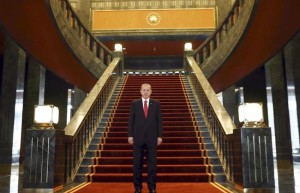Speaking at the closing meeting of the summit of Latin American Muslim leaders on Nov. 15, the president of Turkey, Tayyip Erdoğan, claimed that it was Muslim sailors who had “discovered” America before Columbus.
Erdoğan said: “Latin America’s encounter with Islam dates back to the 12th century. It wasn’t Columbus but the Muslims who discovered America. Muslim sailors arrived in America in 1178.”
Referring to the memoirs of Columbus, he said, “Columbus also mentions a mosque on top of a hill on the coast of Cuba,” adding that he would like to see a mosque built in Cuba on that very hill today.
There are so many mistakes in Erdoğan’s statement that it is difficult to choose where to start. Let us start with the most obvious one and move on to others:
1. Neither Columbus nor the Muslim sailors before him, as Erdoğan claims, “discovered” the continent that happens to be called America today. While estimates vary, America had been populated for thousands of years. There are some well-documented settlements in South America believed to be at least 14,000 years old. At the time Columbus arrived in 1492, it is estimated that approximately 30 million Indigenous people were living in the Americas. By the end of the 17th century, close to 90 percent of that population had disappeared as a result of the European colonization of the continents, the first true genocide of human history.
2. To date, no archaeological evidence, buildings or any other types of artifacts have been found that would prove that Islamic world had made any contact with the indigenous population of America. Even if they had, that would not have meant that Muslims “discovered” America due to the reasons listed above.
3. Columbus never recorded seeing a mosque in Cuba. The claim that Columbus saw a mosque in Cuba is based on an earlier paper by Youssef Mroueh of the As-Sunnah Foundation of America. This claim has long been proven wrong. Mroueh alleges that Columbus saw a mosque on a Monday, on Oct. 21, 1492, as he was sailing near Gibara on the northeast coast of Cuba. There are two main flaws in that claim—firstly, Oct. 21, 1492, did not fall on a Monday, secondly, according to the actual quotes from the log of Columbus’s journey in 1492, recorded later by Bartholome de Casas, it was not a mosque but a hill that looked like a minaret that Columbus recorded seeing. “Remarking on the position of the river and port, to which he gave the name of San Salvador, he describes its mountains as lofty and beautiful, like the Pena de las Enamoradas, and one of them has another little hill on its summit, like a graceful mosque,” is how the actual quote goes in Casas’ account.
Jose Marti Association of Friendship with Cuba responds to Erdoğan
Unlike Erdoğan’s Turkey, the Republic of Cuba is a sovereign, secular state where the working people are in charge of their destiny.
The Jose Marti Association of Friendship with Cuba responded to Erdoğan’s claim with a statement citing the 1st and 55th articles from the Constitution of the Republic of Cuba to remind Erdoğan about Cuba’s sovereignty and its secular society. The Jose Marti Association of Friendship with Cuba is a group founded in 2002 in Turkey with the aim of introducing Cuban culture and history to Turkey while standing in solidarity with the Cuban revolution.
We reprint the 1st and 55th articles of the Cuban constitution here:
1st article: “Cuba is an independent and sovereign socialist state of workers, organized with all and for the good of all as a united and democratic republic, for the enjoyment of political freedom, social justice, individual and collective well-being and human solidarity.”
55th article: “The state, which recognizes, respects and guarantees freedom of conscience and of religion, also recognizes, respects and guarantees every citizen’s freedom to change religious beliefs or to not have any, and to profess, within the framework of respect for the law, the religious belief of his preference.”
The statement continued:
“As also stated in our constitution, the state of Cuba responds to the demands and the needs of the people of Cuba through active participation of the people of Cuba themselves. On that note, the fulfillment of the needs of the Cuban Muslim society is under the guarantee of the Cuban state as part of the planning for the fulfillment of the social needs of all Cuban people. The decision on what to build and where to build in Cuba belongs to the people of Cuba only. This decision is not determined on the wishes of the representative of a foreign state.”
AKP foreign policy—Dreams of a neo-Ottoman empire
The real motive behind the Turkish president’s farcical attempt to rewrite history is not simply rooted in his deep ignorance of world history.
Controversial statements of a religious nature like this one not only help him in consolidating support from the reactionary and right-wing sections of the population that worship him almost as a holy religious figure, but they are also in a sense the manifestation of the foundations of the foreign policy of Justice and Development Party (AKP). That is of a neo-Ottomanist, Sunni-sectarian and aggressive policy that aims to to dominate the region by reviving the legacy of the Ottoman Empire, which at its peak dominated the Middle East, South East Europe and North Africa for centuries under the rule of Sunni Islam before its collapse in 1918 at the end of WW I.
Alluding to this dream, in a speech he gave during the fourth congress of the AKP in September 2012, Erdoğan urged the youth of Turkey to look not only to 2023 but to 2071, when Turkey “would reach the level of her Ottoman and Seljuk ancestors by the year 2071.”
The year 2023 coincides with the 100th year of the foundation of the Republic of Turkey, while 2071 will mark the 1,000th year of the battle of Manzikert, when the Seljuk Turks defeated the Byzantine Empire to occupy parts of Asia Minor, today’s Turkey.
“As in the 16th century, when the Ottoman Balkans were rising, we will once again make the Balkans, the Caucasus, and the Middle East, together with Turkey , the center of world politics in the future. That is the goal of Turkish foreign policy and we will achieve it.” This is how Ahmet Davutoğlu, the current prime minister and former foreign minister described the AKP’s foreign policy in October 2009.
Led by U.S. imperialism, it was that same foreign policy that would two years later sponsor extremist Sunni jihadist groups, including the Islamic State, in AKP’s ambition to overthrow the Syrian government, causing the deaths of thousands of civilians .
On the domestic front, the 12-year-long rule of his Justice and Development Party can simply be characterized by:
- An economy artificially fueled by mega-construction projects, construction of luxury residences, including Erdoğan’s own extremely lavish but ugly 1,000-room palace at a cost of more than $500 million dollars funded by public money, mega-malls, airports, dams, all of which coupled with unprecedented levels of corruption that has enriched beyond limits a group of capitalists within the close circle of Erdoğan
- Ruthless neo-liberal policies, all-out privatization of public resources and enterprises, a massive attack on workers’ rights and unions and the institutionalization of subcontracting jobs, resulting in the super-exploitation of workers in work conditions reminiscent of the 19th century
- Total destruction of the secular nature of the Republic of Turkey through reactionary legislative changes in the constitution, judiciary and public education and a systematic ideological drive to Islamicize all aspects of social life
During the AKP’s 12-year rule, over 13,000 workers lost their lives in mines, construction sites and other workplaces, mainly due to lack of safety measures as the bosses took shortcuts to maximize their profits. As of 2014, Turkey is ranked by the International Trade Union Confederation among one of the worst countries for workers.
Referring to over 300 miners who died last year in Soma, Erdoğan casually remarked that “death is unfortunately in the nature of these types of occupations.” We would in turn like to remind Erdoğan that it is in the nature of the progress of history that from time to time, oppressed people organize, rise up and put an end to the rule of ruthless tyrants.
With that in mind, we suggest, instead of focusing on debunked, past accounts of Cuba from the time of Columbus, Erdoğan study carefully the more recent history of Cuba, namely the Cuban revolution, paying close attention to the end of the corrupt and murderous dictator Fulgencio Batista.




